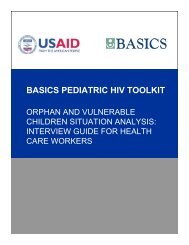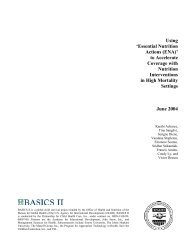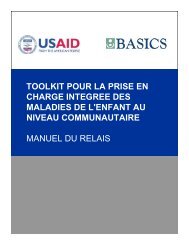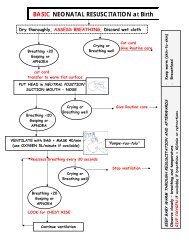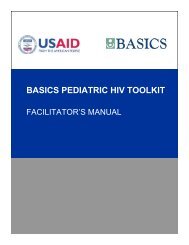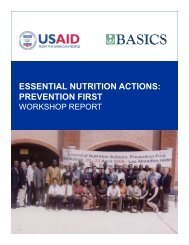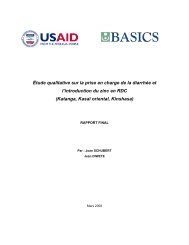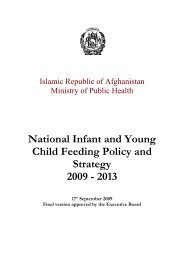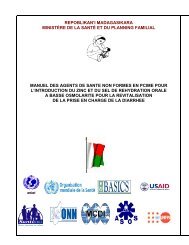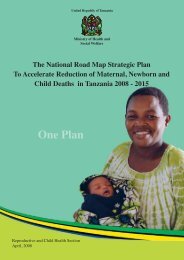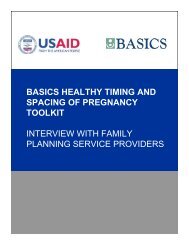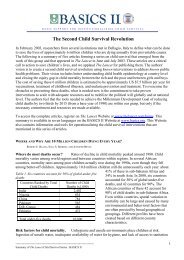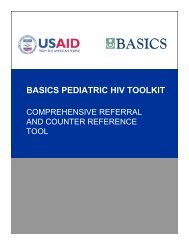Integrated Maternal and Newborn Care Basic Skills Course ...
Integrated Maternal and Newborn Care Basic Skills Course ...
Integrated Maternal and Newborn Care Basic Skills Course ...
You also want an ePaper? Increase the reach of your titles
YUMPU automatically turns print PDFs into web optimized ePapers that Google loves.
Reference Manual<br />
normal. Skilled health workers do not generally carry out home visits in most countries; in some<br />
areas, it may be difficult to have community health workers make home visits at suitable times.<br />
Promotion of early postnatal visits is essential, but it is likely that strategies to deal with the<br />
different scenarios that exist <strong>and</strong> for “covering” the first week of life, including the first 2-3 days,<br />
are even more important. The possible scenarios for this critical period include the following.<br />
• Deliveries may take place at home, <strong>and</strong> both the mother <strong>and</strong> the baby may remain there<br />
throughout the neonatal/postpartum period, bound frequently by strong cultural practices<br />
that, in general, prevent them from going outside their homes.<br />
• Where deliveries take place at the facility level, the stay for a normal delivery may vary<br />
considerably, from a few hours to 2-3 days. Too early a discharge is frequently<br />
associated with inadequate time for evaluation, care, <strong>and</strong> counseling. Longer stays are<br />
associated with overcrowding, potential risk of nosocomial infections, increased costs,<br />
<strong>and</strong> poor compliance by families.<br />
• Chances of an early first visit to the health center after a home delivery <strong>and</strong> return after<br />
discharge from a facility birth depend on the degree of motivation, constraints due to<br />
challenges in family finances <strong>and</strong> transport, resulting in poor access, quality, <strong>and</strong> the<br />
cost of the care provided.<br />
Thus strategies for postnatal assessment <strong>and</strong> basic care need to include both facility <strong>and</strong><br />
community components, involving trained skilled health workers <strong>and</strong> community health workers<br />
(CHWs), with links between the two. These may include home visits by CHWs <strong>and</strong> visits by<br />
mothers <strong>and</strong> babies at the facility, depending on the above scenarios.<br />
Through community mobilization <strong>and</strong> communication strategies, including interpersonal<br />
communication <strong>and</strong> traditional methods <strong>and</strong> use of mass media, families at home can learn<br />
about basic preventive care, identifying danger signs, <strong>and</strong> seeking appropriate care. Trained<br />
CHWs making home visits can also contribute to the latter components. It is far more difficult in<br />
most countries for skilled birth attendants to make home visits. Good links between community<br />
<strong>and</strong> facility level workers can help promote referrals to health centers as required.<br />
In facility deliveries, after birth, it is critical to ensure careful examinations of the mother <strong>and</strong><br />
baby by the skilled birth attendant, with appropriate actions at three points:<br />
• just before transferring them out of the delivery room to the rooming-in ward<br />
• at least once a day during their stay at the facility<br />
• just before discharge<br />
These evaluations will help to identify special risk factors or problems in the early stages that<br />
may necessitate some treatment, a longer stay at the facility, special advice, <strong>and</strong>/or an earlier<br />
follow-up appointment. Proper counseling, especially at discharge, on preventive care at home,<br />
identifying danger signs, <strong>and</strong> appropriate care seeking are also extremely important.<br />
Content of the Postnatal Visit<br />
In addition to having an early visit/contact at the appropriate time, the content <strong>and</strong> quality of the<br />
visit need to be considered. Key components are noted below:<br />
• courteous, supportive behavior towards the mother/family<br />
<strong>Integrated</strong> maternal <strong>and</strong> newborn care<br />
<strong>Basic</strong> skills course<br />
117



